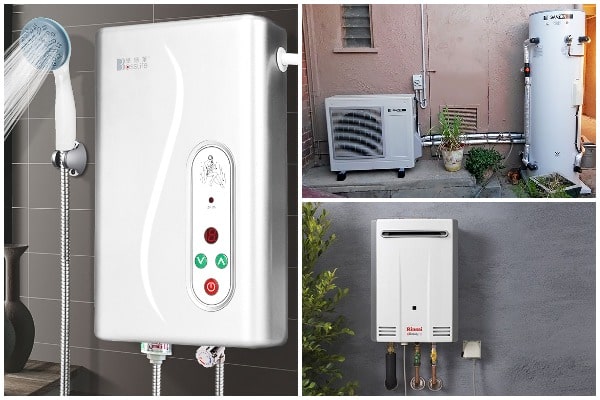Few appliances add as much to modern life as a water heater. It’s hard to beat a warm shower, especially on cold days. Yet there are now several different types of water heaters. The right water heater for one family might be the wrong water heater for another family. Let’s take a look at some of the most popular options. Of course, if you should have any questions or concerns, you should reach out to professional plumbers.

Conventional Tank Water Heaters
When many people think of water heaters, the first thing that will come to mind is a tank water heater. The system is centered on a large, well-insulated tank. Usually, the tank will hold between 30 and 80 gallons of water. The water inside the tank is heated, generally by natural gas or electricity. (You can also get conventional tank water heaters that are heated by oil or propane.)
Water in the tank is warmed up and then stored until it’s needed. As hot water is consumed, more water is pumped into the tank and heated. This process will typically continue 24 hours a day, which can result in increased utility bills, especially if you’re heating water that’s not being used.
Still, traditional water heaters are generally cost-effective, and they are quite easy to maintain. The technologies that make these water heaters possible have been in use for a long time and these systems can last quite a long time. They do take up a lot of space, however, and it’s possible to overexploit the heater and run out of hot water.
Also Read: When choosing a new system, consider whether an expansion tank for water heaters is required to support the type you select.
Tankless Water Heaters
Next up, as the name implies, tankless water heaters do away with the tank. These water heaters heat up water only when you demand it. As such, they are often called “on-demand” water heaters. A well-designed tankless water heater can essentially create an unlimited amount of water. However, the capacity of how much water can be created at once is limited. A tankless heater might provide enough for two hot showers running at once, but not three, for example.
With tankless water heaters, the water is typically run through super-heated coils that can quickly heat up the water. The process isn’t instantaneous, but in practice, it can feel like it’s instant. You can get both electric and natural gas tankless water heaters.
On-demand water heaters are great for large families. If you only use hot water sporadically, these systems may cut down on your utility bills. That said, if you use a lot of hot water on a constant basis, these systems can be expensive to run. Further, tankless water heaters require a large upfront investment in terms of both equipment and installation.
Solar Powered Water Heaters
If you want to improve your environmental footprint, one way to do so is to purchase a solar water heater. As you’ve likely guessed, these water heaters use heat from the sun to heat up water. Similar to a traditional tank water heater, the typical solar water heater is centered around a large, well-insulated tank. Often, the tank is mounted on the roof, but you may find them installed elsewhere.
With some units, fluids in the solar collector are heated up and then passed through a heat exchanger, thus transferring the heat to the water. Other systems use solar energy in different ways to warm water. Many systems are also equipped with either an electric or natural gas backup heater.
Solar water heaters are good for the environment and can save you quite a bit when paying utility bills. However, they are expensive to install and work best in year-round warm climates that enjoy a lot of sunshine. If you live in a cooler climate, these water heaters may not be a good fit.
Also Read: Safety is key with any system—don’t miss the dos and don’ts of hot water heater safety for tips on maintaining your unit effectively.
Choosing the Right Heater for Your Water
There are a few other water heater types. Which type of water heater will work best for your family? It’s wise to chat with a professional plumber. He or she can walk you through the different types, and together, you can identify your wants, needs, and concerns. Then you can select the water heater that is best for you and your family.